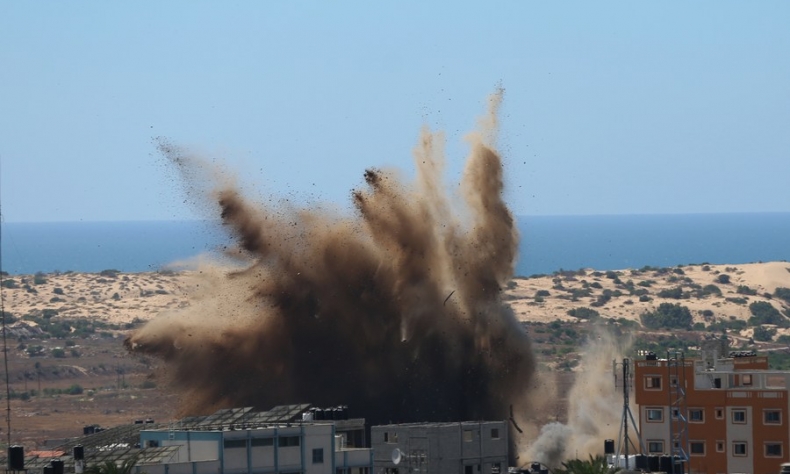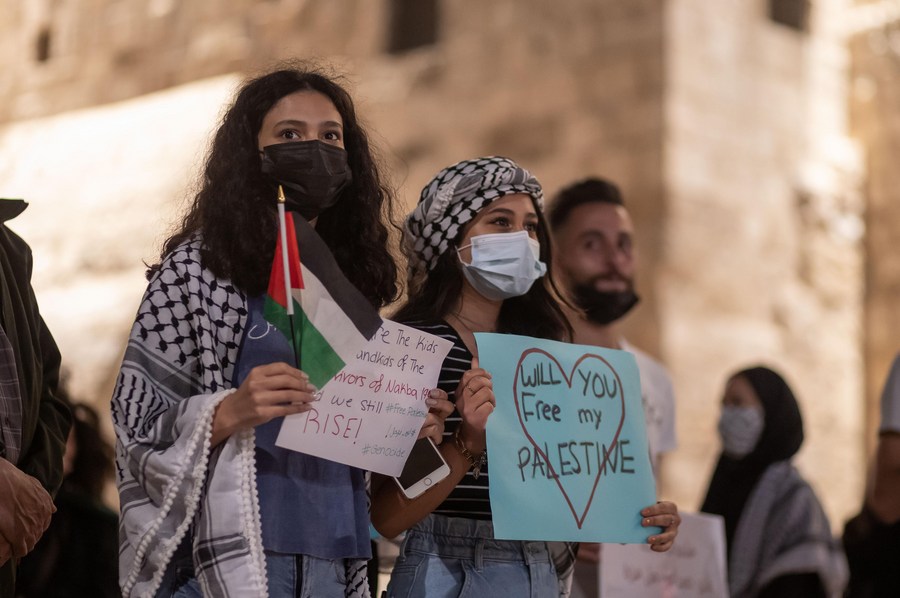Human Rights, U.S. Hypocrisy

The desired goal is to achieve a comprehensive, just and lasting peace on the basis of the “two-state solution” that guarantees the establishment of an independent Palestinian state on the basis of 1967 borders, with East Jerusalem as its capital.
The current confrontation between Israel and Palestine erupted on May 10 and has been deemed the most serious of its kind since 2014. With no hope for peace, the continued tensions have not only impacted security in the Middle East, but also renewed the debate surrounding the Palestinian cause.
Though a ceasefire between Israel and Hamas, the Islamic Resistance Movement, came into effect on May 21, there is no way to end the decades-old cycle of conflict and violence, other than by creating a Palestinian state on the basis of the “two-state solution” under international law and UN resolutions.
U.S. double standard
The UN Security Council (UNSC) failed on three successive occasions to issue a statement or adopt a resolution on this military confrontation due to U.S. opposition. The first two were closed sessions, in which the U.S. rebuffed calls for an immediate ceasefire in the Gaza conflict. The U.S. delegation also pushed to postpone an open UNSC meeting held to discuss the conflict, also with the aim of avoiding a collective call for an immediate ceasefire.
When the open session finally took place on May 16, the overwhelming majority of UNSC members called for an immediate ceasefire, the protection of civilians, and the avoidance of additional casualties. These countries also urged a political settlement and called on Palestine and Israel to resume peace talks on the basis of the “two-state solution.” They stressed that the UNSC should speak with a unanimous voice, advance the peace talks process in a just manner and work for the peaceful coexistence of Palestine and Israel.
Nevertheless, the meeting was unable to agree on a joint statement as the U.S. delegation refused to adopt language that condemned Israel or call for a halt to attacks against Hamas targets in Gaza.
A White House statement, issued after U.S. President Joe Biden spoke with Israeli Prime Minister Benjamin Netanyahu, reflected reticence by the U.S. leader to criticize Israel. Biden’s language notably avoided a demand that the ceasefire be “immediate.”
While advocating respect for human rights as an inclusive humanitarian principle that has no relation to religion, sect, color or origin of individuals, the U.S. turns a blind eye to flagrant violations of human rights in Gaza. Apparently, human rights, in the eyes of the U.S. Government, is a convenient diplomatic tool used to target its adversaries through the practice of double standard.
After Biden said on May 12 that Israel has a right to defend itself without mentioning anything about the Palestinians, progressive Democrats responded by highlighting the leader’s double standard. Congresswoman Alexandria Ocasio-Cortez wrote on Twitter: “Blanket statements like these with little context or acknowledgement of what precipitated this cycle of violence, namely, the expulsions of Palestinians and attacks on Al-Aqsa, de-humanize the Palestinians and imply the U.S. will look the other way at human rights violations.”
Protests in London, Paris, Madrid and Berlin, among other European cities, continue to gather momentum even after the ceasefire. There are people of all ages and ethnic, religious and cultural backgrounds at the demonstrations, including young people, regulars in the Black Lives Matter Movement, with many placards saying, “Palestinian Can’t Breath,” and “Palestinian Lives Matter.” They are seeing parallels between the Black Lives Matter and the Palestinian Lives Matter movements, as both revolve around questions of racial justice, discrimination and human rights.
America’s largest Muslim civil rights group, the Council on American-Islamic Relations, joined a boycott of a virtual White House Eid celebration. “We cannot in good conscience celebrate Eid with the Biden administration while it literally aids, abets and justifies the Israeli apartheid government’s indiscriminate bombing of innocent men, women and children in Gaza,” it said in a statement.
The Organization of Islamic Cooperation submitted a request to the Human Rights Council to convene a special session to address “the grave human rights situation in the Occupied Palestinian Territory, including East Jerusalem,” which was held on May 27. Palestinians are entitled to receive the support of not only Arabs and Muslims but also of every peace-loving person who cannot tolerate seeing houses brought down, families evicted from their homes, women, children, and the elderly being killed, and the sanctity of places of worship violated.

China’s role
As president of the UNSC for May, China has been playing a mediating role. It worked on two emergency consultations and drafted the resulting press statements. On that basis, State Councilor and Foreign Minister Wang Yi chaired the UNSC open debate on the situation in the Middle East on May 16.
Wang put forward a four-point proposal regarding the Palestine-Israel situation. First, a ceasefire and a cessation of violence are the top priorities. He urged all parties, especially Israel, to exercise restraint and stop hostilities immediately. Second, humanitarian assistance is an urgent need. Wang said all parties should step up humanitarian assistance to Palestine and spare no effort to avoid a humanitarian disaster. Third, international support is a due obligation. He called on the international community, especially UNSC members, to support the peace process and help deescalate the situation. Fourth, the “two-state solution” is the fundamental way forward. He said Palestine and Israel should be encouraged to resume peace talks at an early date and advance the political settlement of the Palestine question.
China appreciates the mediation efforts carried out by Egypt and other parties in order to bring about a ceasefire. It stands ready to strengthen communication and coordination with all parties to make concerted efforts for peace. Ambassador Zhai Jun, Special Envoy of the Chinese Government to the Middle East, held separate mediation talks via telephone with officials of the Palestinian and Egyptian foreign ministries. He also had telephone conversations with officials from Israel, Russia, the UN and the EU.
China will provide $1 million in emergency humanitarian assistance to Palestine in cash, and a further $1 million and 200,000 doses of COVID-19 vaccine to the UN Relief and Works Agency for Palestine Refugees in the Near East. It has also pledged more humanitarian supplies to the best of its ability with respect to Palestine’s needs, and an active part in the reconstruction of Gaza.
China reaffirms its invitation to Palestinian and Israeli peace advocates to continue their dialogue in China and welcomes representatives of the two sides to come to China for direct negotiations. It will continue to push the UNSC to comprehensively review the Palestinian question.
Future prospects
The Biden administration has made no secret of the fact that peace in the Middle East is not on its list of strategic priorities. However, the Palestinian question, as is usually the case, has nevertheless erupted, this time at one of the holiest places in Islam, the Al-Aqsa Mosque, and in East Jerusalem in the wake of the Israeli eviction of some Palestinian families.
Israel is the most powerful state in the Middle East in terms of sophisticated military force, capabilities, training, equipment and nuclear weapons. But the recent escalation of conflict showed that Israel had displayed military superiority on the tactical level though, yet on the strategic level it might be another way round. In the long run,
military confrontation is not conducive to solving its existential problems. The recent horrific cycle of hostilities, if left largely unchecked by the international community, will make Israel even more insecure.
Two incontrovertible facts need to be taken into account. Firstly, Israel has to grapple with the question of how this Palestinian cause could have reasserted itself so forcefully. This cause refuses to be buried beneath the rubble of Middle East wars and conflicts, because the Palestinian people still exist. It is impossible to kill the more than 6 million Palestinians living in Palestine, just as it is impossible to erase the sanctity of Jerusalem. Secondly, after nearly eight decades, Israel and the Israelis have become a part of Middle East fabric. It is also a fact that the citizens of Israel have nowhere to go, not to mention that they have a strong and robust state, and they are not ready to pack their bags and head back to wherever they or their ancestors came from.
Both these facts compel the two sides and the world to be realistic and explore the means for coexistence. This entails an examination of the relevant international agreements and UN resolutions, as well as the various peace agreements, from the Egyptian-Israeli and Jordanian-Israeli peace treaties to the more recent “Abraham Accords.”
The road ahead will not be easy. Extremists on both sides will not hesitate to sabotage any serious international effort to re-launch the peace negotiations. Israel has no government, and the prospect of holding a fifth set of elections in the country is not to be discarded. For the Palestinian people, establishing a viable Palestinian state is not something that can be accomplished solely through an agreement with Israel. The Palestinians might have to come to terms with the fact that one of the essential prerequisites of statehood is that the state should have a unity government to speak for all Palestinians in the Gaza Strip and on the West Bank.
The current priority is to bolster the ceasefire, introduce much-needed humanitarian assistance to Gaza, and commence with the reconstruction plan for the devastated Gaza Strip.
In the long run, the absence of any real prospects for peace brings a risk of renewed conflict. The desired goal is to achieve a comprehensive, just and lasting peace on the basis of the “two-state solution” that guarantees the establishment of an independent Palestinian state on the basis of 1967 borders, with East Jerusalem as its capital.
What is more important is that outside powers shall stop exploiting divisions and conflicts as a means to weaken the countries of the Middle East, and take real care of human rights.
The author is an op-ed contributor to Beijing Review and an expert on international studies.
 Facebook
Facebook
 Twitter
Twitter
 Linkedin
Linkedin
 Google +
Google +










